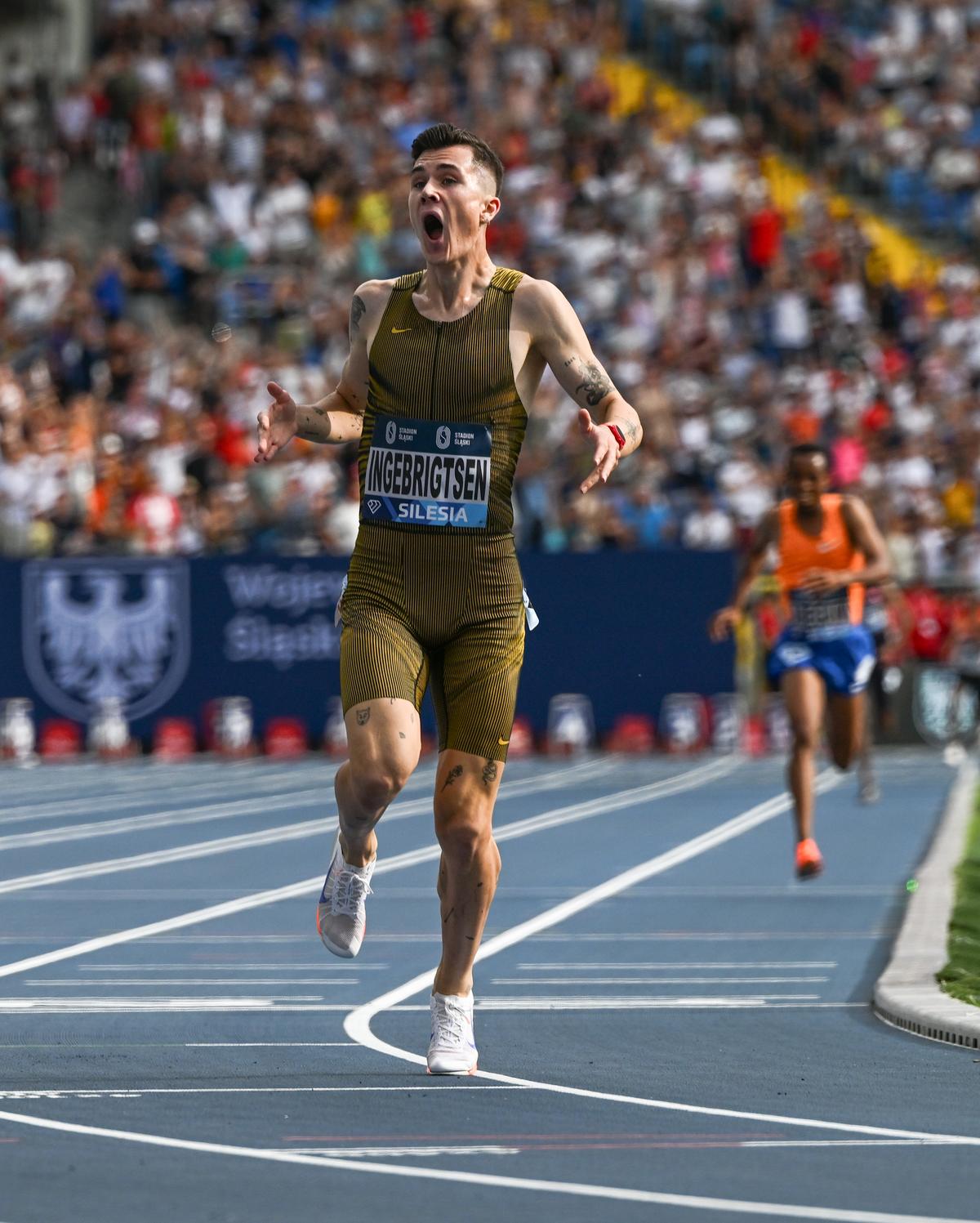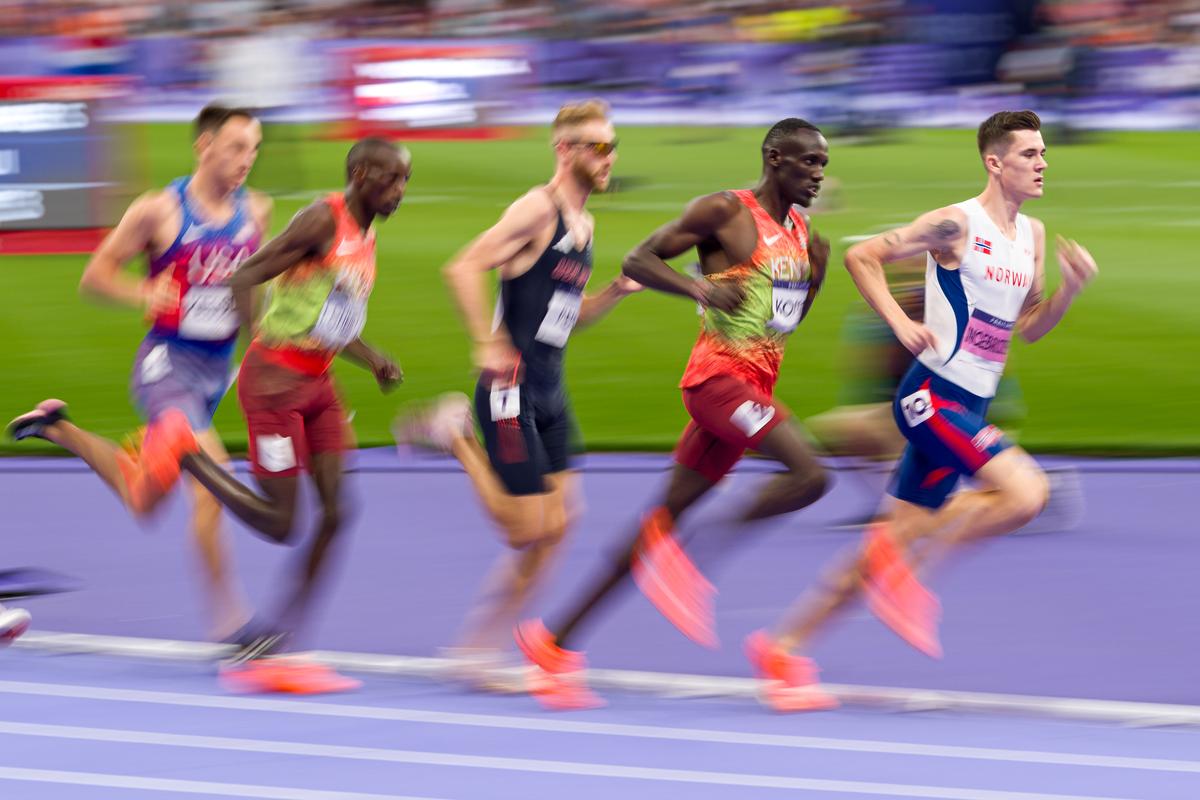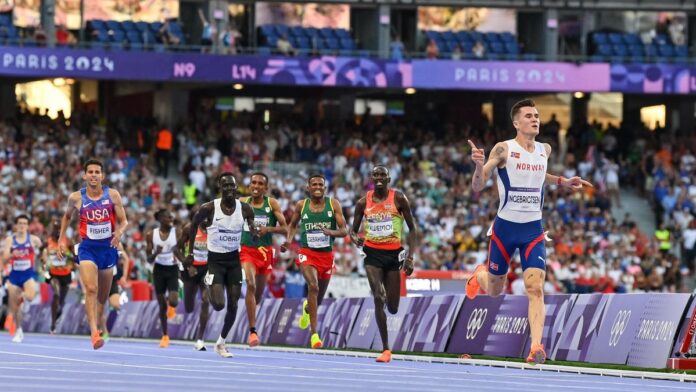Jakob Ingebrigtsen did not raise too many eyebrows when he declared before Paris 2024 that he was the overwhelming favourite for the 1,500 metres. “If I don’t get injured and I don’t get sick, I think it’s going to be a walk in the park,” he said.
Ingebrigtsen has a habit of making grand proclamations. At just 18, he came up with “I don’t consider anyone better than me until it’s proven”, and last year he announced that his “goal is to become the greatest runner of all time”.
Addicted to winning
The Norwegian also walks the talk more often than not. A serial winner, he was seeking to match Briton Sebastian Coe, the only man to claim two Olympic 1,500m titles. When Ingebrigtsen raced to gold in Tokyo, he appeared untouchable in the event.
But nobody, least of all the uber-confident 23-year-old, could have foreseen back-to-back world championship defeats before Paris 2024. The first came in Eugene in 2022, when Britain’s Jake Wightman had the temerity to pass him entering the last 200 metres. A year later at the Budapest worlds, Josh Kerr delivered an amazing carbon copy for another British gold.
Ingebrigtsen, who like most elite athletes doesn’t digest defeat too well, was drawn into a war of words with Kerr. After coming up short in Budapest, he called Kerr “just the next guy”. Kerr later claimed Ingebrigtsen had “major weaknesses” and the Norwegian fired back saying he could beat the Briton “blindfolded”.
As a result, the 1,500m final in Paris, billed as a showdown between Ingebrigtsen and Kerr, was one of the most hotly anticipated races of the Games. Ingebrigtsen, who had strung together an impressive summer streak of 1,500m wins, culminating in a European record run in Monaco, was the odds-on favourite and appeared intent on stamping his authority from the start.

Middle-distance titan: Ingebrigtsen broke the longest-standing men’s athletics world record in individual track events when he won the 3,000m at Chorzow last weekend. | Photo credit: Getty Images
The Norwegian set a scorching pace early, aiming to both destroy his rivals’ legs and show them who was boss. But the approach backfired. Cole Hocker, Kerr and Yared Nuguse passed a flagging Ingebrigtsen before the finish, terminating his title defence.
After having lost the plot so spectacularly and being run out of the medals, Ingebrigtsen responded in the best manner possible. He accepted the defeat without offering excuses. “Well, I guess he [Kerr] did show up after all,” he wrote on his Instagram page. “Cole Hocker, Yared Nuguse and Josh Kerr outsmarted me. They were ‘the best guys’ when it really mattered. And I want to congratulate them all on a great performance.”
Instant amends
Ingebrigtsen then turned his attention to the 5,000 metres, determined to make immediate amends. He won Olympic gold with a fierce final lap, adding to his two world titles over the distance, and earning himself some redemption. He became the third man in history, after Paavo Nurmi and Hicham El Guerrouj, to win Olympic titles in both the 1,500 and 5,000m. Nurmi (1924) and El Guerrouj (2004), however, achieved the feat at the same Games.
But Ingebrigtsen wasn’t satisfied; the 1,500m defeat at the Olympics still rankled. Last week’s Lausanne Diamond League offered an opportunity to extract a small measure of revenge, given that he would race Hocker again. Ingebrigtsen duly regained his authority over the distance, beating the reigning Olympic champion by more than two seconds.
Ingebrigtsen accelerated to the front after the initial pace-setters faded, with a couple of American runners on his coattails. He led going through the bell for the final lap, Hocker tried to respond at the 150m mark, but this time there was no catching the Norwegian, who had stayed sensible in the early running. The 3:27.83s in balmy conditions was a far cry from his personal best 3:26.73, but it answered the questions Ingebrigtsen had been grappling with.
“It’s been almost two weeks since Paris so there was plenty of time to recover,” said Ingebrigtsen. “For me a lot of it has been mental, including going home, taking some easy days and then getting back to work. Tonight’s race gave me good answers and I’m looking forward to building on this for my next race and the rest of the season.”
Ingebrigtsen did build on the win days later, shattering the decades-old 3,000 metres world record by more than three seconds at the Chorzow Diamond League meeting. He finished in seven minutes 17.55 seconds, erasing the 1996 record set by Kenya’s Daniel Komen (7:20.67). It was the longest-standing men’s athletics world record in individual track events.
The 23-year-old was in shock when he crossed the line and looked at his time, putting his hands on his head in disbelief.
“It feels special, amazing. Based on my training, I can never predict exactly what kind of time I am capable of,” he said. “I would not have imagined I could run 7:17, though. At the beginning the pace felt really fast but then I started to feel my way into the race and found a good rhythm. [The] 3,000 is a tough distance. After four-five laps you feel the lactic acid but you need to get going. The conditions were difficult with the heat but it is the same for everyone.”
Hunting world records
Last September, Ingebrigtsen had smashed a 24-year-old world record in the rarely run 2,000 metres by more than a second, finishing in 4 minutes, 43.13 seconds at a Diamond League meet in Brussels. “It’s always fun to break a record but, to be honest, it wasn’t difficult for me to break this one,” he had said then.

Physical outlier: Ingebrigtsen’s ability to quickly reach his maximum oxygen consumption and maintain it through a race makes him such a singular athlete. | Photo credit: Getty Images
The ambitious Ingebrigtsen has other world records in his sights as well, and science suggests he has what it takes to launch assaults on the best marks of all time. A study published in the journal Frontiers in Sports and Active Living, based on performance data gathered from elite athletes, claimed that Ingebrigtsen’s ability to quickly reach his maximum oxygen consumption (VO2) and maintain it through a race explained his dominance in the middle distances.
This particularity allows the Olympic champion “to run at a greater pace than his competitors throughout the race, even though we see him start less strongly,” said Amandine Aftalion, co-author of the study.
Ingebrigtsen tempered his tendency to make sweeping pronouncements, but only slightly. “It is truly amazing how we as athletes develop ourselves and we run even faster at almost every competition we participate,” he said. “Now I want to challenge world records at all distances, but it is one step at a time.”

